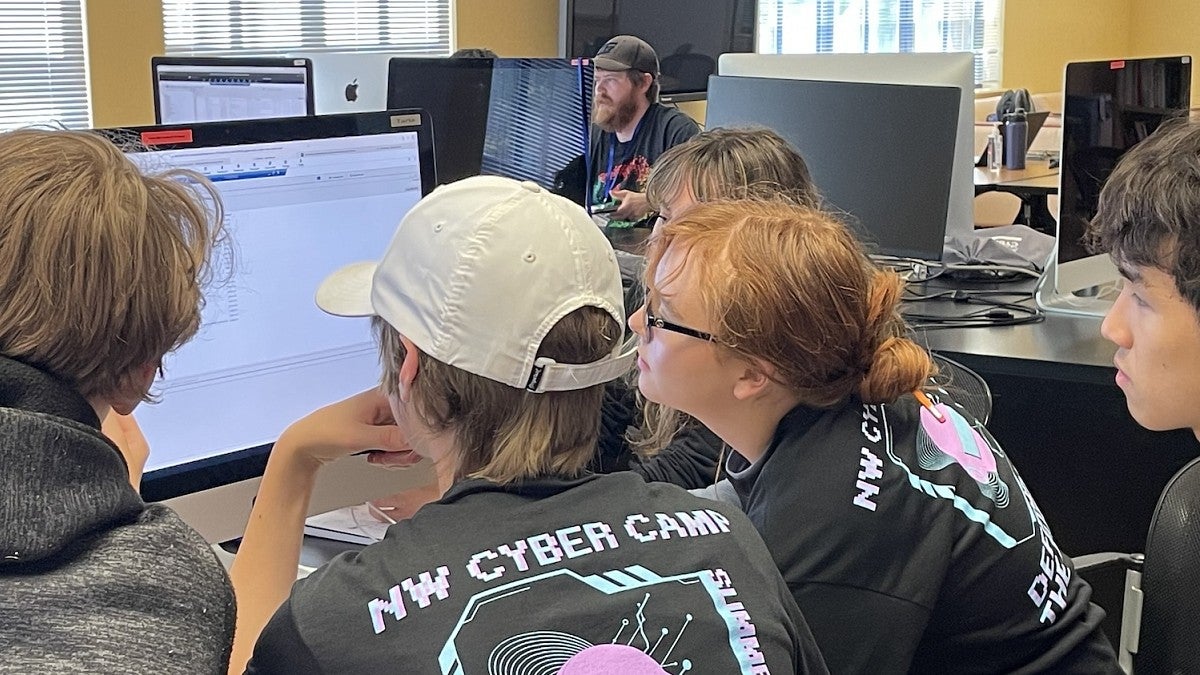
August 8, 2024 - 1:00pm
A handful of teenagers cluster around a computer, trying to crack a password.
Their mission: Comb through the user’s emails and browser history for suspicious activity to help catch an intellectual property thief.
At NW Cyber Camp, a free weeklong summer camp hosted by the University of Oregon Department of Computer Science, high school students learn some of the same skills cyber criminals use to hack into computer networks—but unlike illegal hackers, they’re using their abilities for good.
“I like the idea of helping to protect people, especially more vulnerable people, from cyberattacks as they become more prevalent,” said AnnaLisa Hisamoto, one of 12 local students who attended the camp in July.
Now in its second year at UO, the camp draws high school students from Eugene and beyond to campus for a week of experiential learning activities designed to give them insight into what a career in cybersecurity might look like. The camp is offered at no cost to students to make it accessible to everyone, said Reza Rejaie, professor and head of the Computer Science department.

“We want to provide an environment where young people who are interested in cybersecurity and computer science have the opportunity to test drive it first,” said Dennis Miller, a computer science instructor. “This is their chance to look under the hood and see what it’s really about.”
With funding from both the National Security Agency and the state legislature, the camp is offered in several locations across the state through the Oregon Cybersecurity Center of Excellence, which is jointly run by the UO, Oregon State University and Portland State University. Using curriculum developed at OSU, its goal is to help create a pipeline for high school students who are interested in entering the cybersecurity workforce.
“Cybersecurity is no longer an ideal, it is an absolute necessity,” Miller said. “Unfortunately, there's a huge deficit of people available to implement cybersecurity.”
Not only do students get to work with UO computer science faculty, staff and graduate students, but they get to meet cybersecurity professionals who are working at tech companies and organizations such as the FBI.
Part of the camp’s purpose is to “get real with people’s expectations about the field and show examples of people who look like them so they can see it’s totally achievable,” said Dan Carrere, a senior instructor of computer science.
“Whether due to lack of gender inclusion or economic circumstances, the reality is that there are spectacular people who can contribute to the industry, but who haven’t had the opportunity,” he said.
High school student Heidi Holmes didn’t know anything about cybersecurity when she signed up for the camp. Now she’s versed in basic cryptography techniques and other cybersecurity-related skills.
“I’m meeting a lot of new people and learning about different career opportunities in cybersecurity,” she said.
Although high school student Zane Jennings dreams of becoming a video game designer, he considers cybersecurity a good option to fall back on.
“Security is very important, and everyone should have access to security online,” he said. "It feels like you’re solving a mystery. I really enjoyed looking through this fictional person’s emails and search history for any suspicious behavior.”
Using fictional scenarios made the hands-on learning activities feel realistic, added high school student Devin Lin.
“It’s a good overview of what working in cybersecurity is actually like,” he said.
—By Nicole Krueger, College of Arts and Sciences
